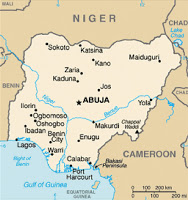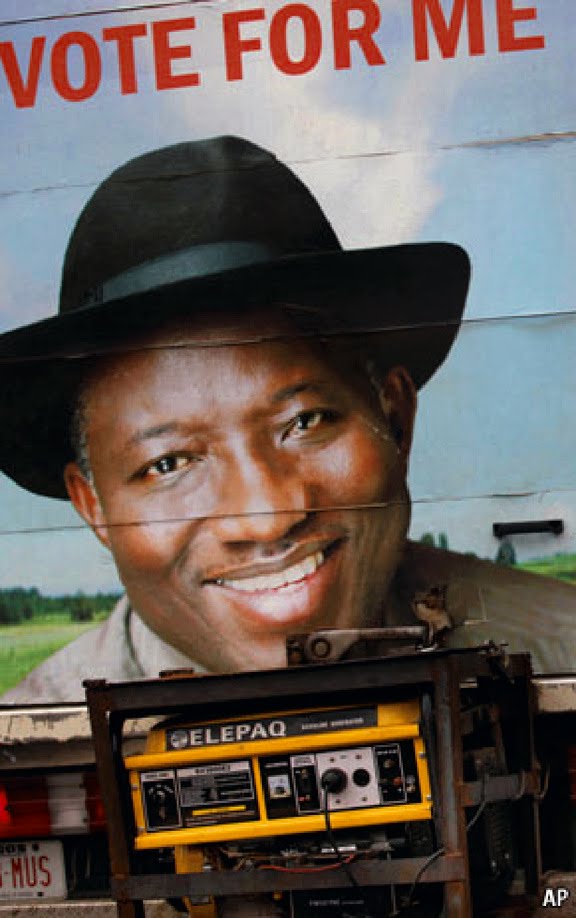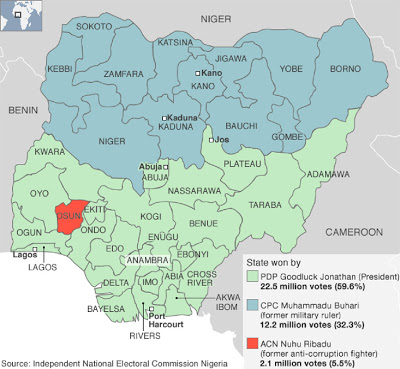The Elections in Nigeria:
Slouching towards democracy
By Paul Beckett / The Rag Blog / April 29, 2011
The perils of democracy
To title (and set) his 1958 novel Things Fall Apart, Nigeria’s great novelist, Chinua Achebe, drew on lines from the poem by William Butler Yeats which begins:
Turning and turning in the widening gyre
The falcon cannot hear the falconer;
Things fall apart; the centre cannot hold;
Mere anarchy is loosed upon the world…
And ends:
And what rough beast, its hour come round at last,
Slouches towards Bethlehem to be born?
— “The Second Coming,” William Butler Yeats, 1920
Nigeria is among the world’s most dangerous countries. Nigeria has the seventh-largest population in the world (nearly 160 million), and that population is a potentially explosive mixture of peoples, regions, and religions — a mixture of almost infinite complexity.
The center’s holding (to paraphrase Yeats) has indeed been challenged throughout Nigeria’s 51 years of independence. At various times, Olusegun Obasanjo, Nigeria’s longest-serving head of state (sometimes military, sometimes elected) has compared his country’s potential for violence to cases like Bosnia, Rwanda or Burundi — but on a much larger scale.
Nigeria came to independence two years after Achebe’s book was published with a British-style parliamentary electoral democracy in place. Unsurprisingly, the country’s experience with democracy since has been rocky. “Mere anarchy” (Yeats uses “mere” in the obsolete meaning of “pure” or “unmixed”) has frequently seemed close by.
As Nigeria celebrated the 50th anniversary of its independence from Britain last year, the country had had elected governments for only about 20 years. The other 30 were accounted for by a succession of military governments, each a bit more dictatorial (and corrupt) than the one before. In its democratic interludes, it took Nigeria only about 40 years to get into its “Fourth Republic” (the present one); reputedly volatile France required about a century and a half to achieve the same.
 Nigeria has spent enormous sums of money trying to create fair and transparent electoral systems. Yet rare is the election that has not been condemned as false by the loser (often, by everyone except the winner!). Over the 20-some years of democracy, vote-buying, thuggery, bribery, and ballot box-stuffing have been developed into high art forms. Sometimes the ballot boxes are simply stolen. Or, perhaps, stolen and stuffed. Voter registration, a vast process usually commenced too late, has often verged on chaos (if not “mere anarchy”).
Nigeria has spent enormous sums of money trying to create fair and transparent electoral systems. Yet rare is the election that has not been condemned as false by the loser (often, by everyone except the winner!). Over the 20-some years of democracy, vote-buying, thuggery, bribery, and ballot box-stuffing have been developed into high art forms. Sometimes the ballot boxes are simply stolen. Or, perhaps, stolen and stuffed. Voter registration, a vast process usually commenced too late, has often verged on chaos (if not “mere anarchy”).
Polling station administration has usually seemed imperfect and sometimes much worse than that. Nigeria’s last round of general elections, in 2007, was condemned universally by observers as almost hopelessly flawed by violence, rigging, and mismanagement. (For one of the reports, go here.)
As we recommend democracy for all countries, we should be conscious that democracy can be dangerous in a country like Nigeria: very dangerous. Democracy has been a significant factor in Nigeria’s horrific communal clashes (stretching from the pogroms against the Igbos in the middle 1960s to the bloody clashes in the Jos area that are on-going now). Scores and sometimes hundreds have been killed in violence in each national election.
By its nature, then, Nigeria does not seem a natural case for Western-style competitive electoral democracy. When I lived in Nigeria in the early 1970s, the number of separate ethnic groups was put at 250; the figure used now is 389. (Imagine for a moment the French, German, British, or American democracies functioning with 389 different national traditions and identities in play.)
Overlaying the ethnic mosaic are traditions of regional hostility (both great and small). Since the 1980s, religion (Muslim or Christian) has become vastly more important as a basis for often violent conflict. Access to education, and therefore literacy, varies widely through the country. Finally, poverty, the national oil wealth not withstanding, is endemic, and wealth differentials are, well, worse than in the U.S.
Just as a reminder, Western-style democracy has generally flourished in — you guessed it! — Western countries characterized by a large middle class, high literacy, and a much higher degree of national integration.
In a sense, the puzzle is that Nigeria has tried so hard and persisted so long in the effort to make democracy work.
The effort to create democracy
But try they certainly have, in a creative, participatory, and deeply serious way which will surprise those who know Nigeria mainly for corruption and “419” email scams.
In the latter 1970s, after a failed First Republic and a decade of military rule, Nigerian military leaders and civil society intellectuals (academics, administrators, doctors, lawyers, journalists) put their heads together to try to figure out how Nigeria could be a democracy. A kind of “great debate” occurred in a constitutional convention and through the media (it reminded yours truly of the Federalist Papers episode in our own history).
A constitution was designed in which electoral success went to the leaders and the parties who best reached across the old divides of region and ethnicity, while punishing those who waged ethnic or regional political warfare. A principle of “federal character,” which essentially means fair representation of Nigeria’s constituent regions and peoples, ran through the constitution. (In some applications, it resembles American affirmative action practices.)
Thus, to illustrate with the presidential election (the one Nigerians care most about), to win a candidate must win by a majority of votes cast (so run-offs are likely), but also must receive at least 25% of the votes cast in two-thirds (24) of the 36 states in the Nigerian federation.
Other features were requirements placed on the political parties to be truly national in scope, a powerful independent, non-partisan electoral commission to prepare and run the elections, and judicial review of challenges.
What is interesting is that, while Nigeria has had three constitutional revisions since the totally disastrous First Republic, the basic elements have carried through each one.
As a distant and somewhat desultory observer, I have felt for some time, and feel more certain all the time, that Nigeria has been subject to a kind of creeping constitutionalism and a growing habit of democracy over more than three decades.
The 2011 general elections
This month Nigeria has completed a mammoth round of elections: for the federal bicameral legislature (April 9), the federal presidency (April 16), and governors of the 36 states (April 26). The scale of the exercise was enormous in every way (very much including cost which has been estimated at more than half a billion dollars).
Some 325,000 poll workers manned many thousands of polling stations scattered throughout a vast country where communications and transportation infrastructure remain limited. Sixty-three political parties were registered; at the presidential level, 21 had fielded candidates. (For more details, go here.)
How did it go?
The ominous precursors were there. The elections, originally scheduled for December 2010, had to be pushed back twice. As usual, registration was a last-minute achievement. There were many problems with ballots, both their preparation and printing (they were complicated with many minor parties that had to be correctly listed) and ballot security.
There were many efforts to rig or otherwise falsify or even to derail the elections completely. Just before the presidential election a vehicle traveling north was found to contain 100,000 ballots marked “tendered ballot papers.” Serious bombings occurred before and during the elections.
Also very ominous was a spike in violence (or arbitrary arrest) directed against reporters. This was reported by the international organization Reporters Sans Frontieres, which noted:
Nigeria has one of the poorest media freedom ratings in Africa and is 145th out of 178 countries in the 2010 Reporters Without Borders worldwide Press Freedom Index.
One could go on and on with such ominous reports. But: surprise!
The Economist (London) almost gushed: “Nigeria’s Successful Elections: Democracy 1, vote-rigging, 0.” They went on, “Gambling on the world’s most expensive voting system has paid off.”
The leader of an international team of observers, Robin Carnahan of the (U.S.) National Democratic Institute, said the vote was “largely free and fair.”
“There were a number of people in our delegation that observed the elections in 2007,” Carnahan said,
and they said they felt like there was a marked difference this year. That there was a determination on the part of the Independent National Electoral Commission to run a real election, [and] a free and fair election. There was determination on the part of the Nigerian people to participate in an election that really reflected their voice.
European Union and Economic Community of West African States (ECOWAS) teams’ reports were similar, as was the verdict of the U.S. State Department.
Sweet music!
But then the music ended.
Serious rioting broke out in most of the far northern states, with hundreds killed. There were renewed bombings on the eve of the last set of elections for governor on April 26 (and they could not be held on schedule in at least two of the states). Meanwhile, the major opposition candidate for President (Muhammadu Buhari of the Congress for Progressive Change party) and many others are charging (what else?) “massive rigging” that falsified the election.
The balance sheet
As the dust clears (and, as the bodies are buried), we see that the damage has been great: more than 500 killed, many more wounded, much property loss, much personal displacement, much loss of personal sense of security. The election and its aftermath have further exacerbated the dangerous combination of anger and fear at the Muslim/Christian interface, especially in the northern states.
If the presidential election of Goodluck Jonathan of the People’s Democratic Party was generally peaceful and fair, as observers tell us, the results may still prove dangerous for the future.
Jonathan (Christian, from a southeast minority ethnic group) represented the dominant party (PDP) and his victory was expected by most. He handily met the constitutional requirements for election taking nearly 60% of the popular vote, and winning 24 states outright.
Meanwhile, his principal opponent, Muhammadu Buhari (Muslim, Hausa-Fulani, from Katsina) swept the 12 most northern states, but failed to carry any states outside that group (including those that in past elections have tended to associate with the “far north”).
Thus, while Jonathon’s election complied easily with the constitutional requirements for national reach, paradoxically this presidential election seemed to result in a situation of stark regional, ethnic, and religious separation that we have not seen before.
Slouching towards democracy?
There were a number of special circumstances in the candidacy of Goodluck Jonathan and the opposition led by Muhammadu Buhari that are too complex to deal with here. Yet, even with allowance being made for these, the 2011 elections are likely to be seen as a watershed in Nigerian politics.
Viewed in national political terms, the far north finds itself (temporarily, at least) in unprecedented isolation. Over most of the previous half century, the Muslim (in ethnic terms, mainly Hausa-Fulani and Kanuri) far north (it was sometimes referred to as the Holy North in the old days) has generally provided the core political leadership for the rest of the huge area of the original Northern Region. During the first political decade, their dominance was absolute.
And throughout the independence period the influence of the far north has been disproportionate at the national level, too. Of the 13 men who have headed the Nigerian government (military or civilian) since 1960 (see list here), eight have been northern Muslims (one other was a northern Christian).
Six of the northern Muslims have been from the core Hausa-Fulani or Kanuri states of the far north. All four of the southern Christian leaders owed their original accession to accidental factors (Jonathan, the latest, became President unexpectedly in May last year after Umaru Yar’Adua (Hausa-Fulani, Katsina) developed a serious illness and finally died in office).
Thus, the landslide election of Jonathan may mark a watershed event in the evolution of Nigerian politics. The historic pattern of at least mild hegemony exerted from the far north may have largely run its course.
This assumes that Nigeria continues its “slouching” progress (borrowing again from Yeats) toward institutionalizing electoral democracy.
Which in turn returns us to the question: Why does Nigeria work so hard and so persistently to create a functioning, stable, permanent democracy?
The costs and dangers, after all, are great. With the country’s complex ethnic makeup, and the now bitter relations between many Christian and Muslim communities, Nigerians know that they live over a political sea of magma that could, at almost any time, erupt.
Yet Nigeria persists in the effort, and, I believe, will continue to persist. At the time that Nigerians were emerging from more than a decade of military rule in the latter 1970s, intellectuals advanced many ideas for a constitutional system that would work for Nigeria, not as one might want Nigeria to be, but as it is. A number advocated indirect, or “guided democracy,” or a benign single-party system.
Ultimately, such compromises were rejected in favor of straight, unadulterated winner-take-all electoral democracy with competitive parties. The preponderance of opinion was that Nigeria was too complex a country to function as a single party system, and their experience with military rule had convinced them that benign dictatorship never remains benign.
One could say that Nigeria needs to be a democracy not in spite of its staggering complexity, but because of it.
[Paul Beckett taught political science at Ahmadu Bello University in Zaria, Nigeria, from 1969 to 1976. He is co-author of Education and Power in Nigeria and co-editor of Dilemmas of Democracy in Nigeria.]



















